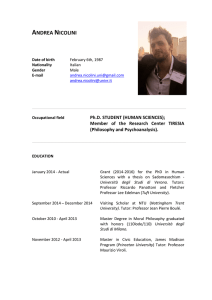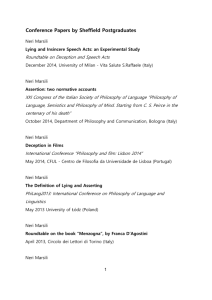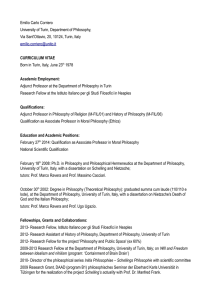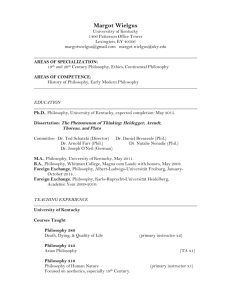Philosophy is all around you (and that includes pop
advertisement
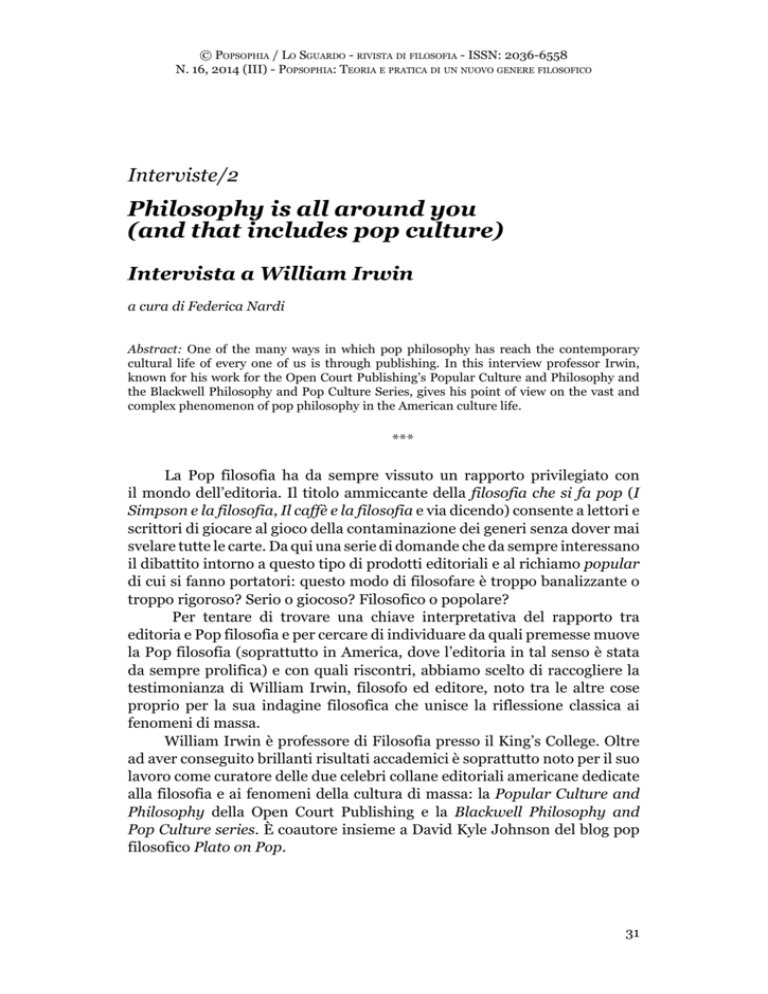
© Popsophia / Lo Sguardo - rivista di filosofia - ISSN: 2036-6558 N. 16, 2014 (III) - Popsophia: Teoria e pratica di un nuovo genere filosofico Interviste/2 Philosophy is all around you (and that includes pop culture) Intervista a William Irwin a cura di Federica Nardi Abstract: One of the many ways in which pop philosophy has reach the contemporary cultural life of every one of us is through publishing. In this interview professor Irwin, known for his work for the Open Court Publishing’s Popular Culture and Philosophy and the Blackwell Philosophy and Pop Culture Series, gives his point of view on the vast and complex phenomenon of pop philosophy in the American culture life. *** La Pop filosofia ha da sempre vissuto un rapporto privilegiato con il mondo dell’editoria. Il titolo ammiccante della filosofia che si fa pop (I Simpson e la filosofia, Il caffè e la filosofia e via dicendo) consente a lettori e scrittori di giocare al gioco della contaminazione dei generi senza dover mai svelare tutte le carte. Da qui una serie di domande che da sempre interessano il dibattito intorno a questo tipo di prodotti editoriali e al richiamo popular di cui si fanno portatori: questo modo di filosofare è troppo banalizzante o troppo rigoroso? Serio o giocoso? Filosofico o popolare? Per tentare di trovare una chiave interpretativa del rapporto tra editoria e Pop filosofia e per cercare di individuare da quali premesse muove la Pop filosofia (soprattutto in America, dove l’editoria in tal senso è stata da sempre prolifica) e con quali riscontri, abbiamo scelto di raccogliere la testimonianza di William Irwin, filosofo ed editore, noto tra le altre cose proprio per la sua indagine filosofica che unisce la riflessione classica ai fenomeni di massa. William Irwin è professore di Filosofia presso il King’s College. Oltre ad aver conseguito brillanti risultati accademici è soprattutto noto per il suo lavoro come curatore delle due celebri collane editoriali americane dedicate alla filosofia e ai fenomeni della cultura di massa: la Popular Culture and Philosophy della Open Court Publishing e la Blackwell Philosophy and Pop Culture series. È coautore insieme a David Kyle Johnson del blog pop filosofico Plato on Pop. 31 © Popsophia / Lo Sguardo - rivista di filosofia - ISSN: 2036-6558 N. 16, 2014 (III) - Popsophia: Teoria e pratica di un nuovo genere filosofico “Pop Philosophy” is a term whose origins date back in 1970 with the Anti-Oedipus by Deleuze and Guattari. Since then, this new approach to contemporary issues has grown worldwide. Nevertheless many still wonder about its precise definition. So we start from this point: what Pop Philosophy is really about and how does it differ from other approaches to philosophy? Irwin: Pop Philosophy can be many different things, but I believe that what all instances have in common is the intention to reach a non-academic audience. In this sense Pop Philosophy plays a role like that of popular science. It takes the work of experts and makes it available for non-experts. As examples of Pop Philosophy I think of The Philosophers’ Magazine and Philosophy Now, periodicals aimed at a general readership. In addition, of course, I would include the various philosophy and pop culture books that I have edited, beginning with Seinfeld and Philosophy in 1999. Pop Philosophy would also include books that employ the techniques of analytic philosophy for a broad audience, like Assholes: A Theory, and books that apply the history of philosophy to modern problems, like Alain de Botton’s The Consolations of Philosophy. Pop Philosophy has split the academic world in two sides in Italy. One side addresses Pop Philosophy as a pseudo-philosophy, which would bring philosophy to become eventually a mere show, giving up the inner complexity of though and lexicon. The other side is formed by those philosophers who have proven to be capable of join popular culture with philosophy to tackle classical philosophical issues as well as contemporary cultural products (tv shows, art, comics and so on), not renouncing to the sharpness of analysis. Being a professor yourself, how do you think Pop Philosophy is perceived in the United States cultural life? Is the academic world ready to welcome the new questions posed by popular culture? Irwin: In the United States there is a similar split in the perception of Pop Philosophy. When I first started combining the analysis of popular culture and philosophy fifteen years ago I met much more resistance than I do today. Many academic philosophers jumped to the mistaken conclusion that I was offering the analysis of popular culture and philosophy as a substitute for traditional philosophy. But it has become clear over the years that my intention is quite different, and the criticism has become less common. The books in my philosophy and pop culture series are intended to reach people who might not otherwise be interested in philosophy. Ideally, the books can show such people the relevance of philosophy and get them interested in the subject. There are still some orthodox purists who do not like the analysis of popular culture and philosophy, but they have no cogent arguments against it to offer. It is simply a matter of taste. Pop philosophy, however, doesn’t really raise any new questions. Rather, it addresses perennial philosophical 32 © Popsophia / Lo Sguardo - rivista di filosofia - ISSN: 2036-6558 N. 16, 2014 (III) - Popsophia: Teoria e pratica di un nuovo genere filosofico questions by drawing on examples from pop culture. And I should add that the writing involved is difficult. People sometimes mistakenly assume that because pop philosophy reads easily that it was written easily. The truth is that a great deal of effort goes into writing in an accessible way, and not all philosophers have the skill set necessary for this kind of writing. From coffee to the last HBO show, from fashion to metaphysical questions, from Beethoven to Rihanna, everything seems to fall in the field of interest of Pop Philosophy. How does it work? Can every object potentially lead to a philosophical matter? Irwin: Anything of interest to human beings is a potential subject for philosophy and philosophers; in that sense, there is some philosophy behind everything. Of course, some subjects are more philosophically rich than others. Science fiction films, for example, often naturally raise philosophical issues whereas talent competitions like American Idol do not raise philosophical issues quite as easily. So I don’t rule out anything in advance when it comes to potential topics in my philosophy and pop culture series. Many mainstream tv-show and narrative fiction’s screenwriters (such as The Big Bang Theory and True Detective) are philosophy graduated or have openly claimed to be inspired by the works of philosophers like Nietzsche, Foucault, Agostino and so on. Is fiction the future of philosophy? Irwin: Fiction is a very powerful tool of mass communication. It seems like we have seen an increase in self-consciously philosophical movies and television shows since The Matrix was released in 1999. This is a trend that will likely continue. It would be terrific if a major contemporary philosopher would produce a work of fiction that would reach a mass audience. Writing fiction and writing philosophy require different sets of talents, though. So at the moment we have fiction writers who know some philosophy but who are not really philosophers. Luckily, that makes work for people like me, who come along and interpret, apply, and explain their works of fiction from a philosophical point of view. 33
